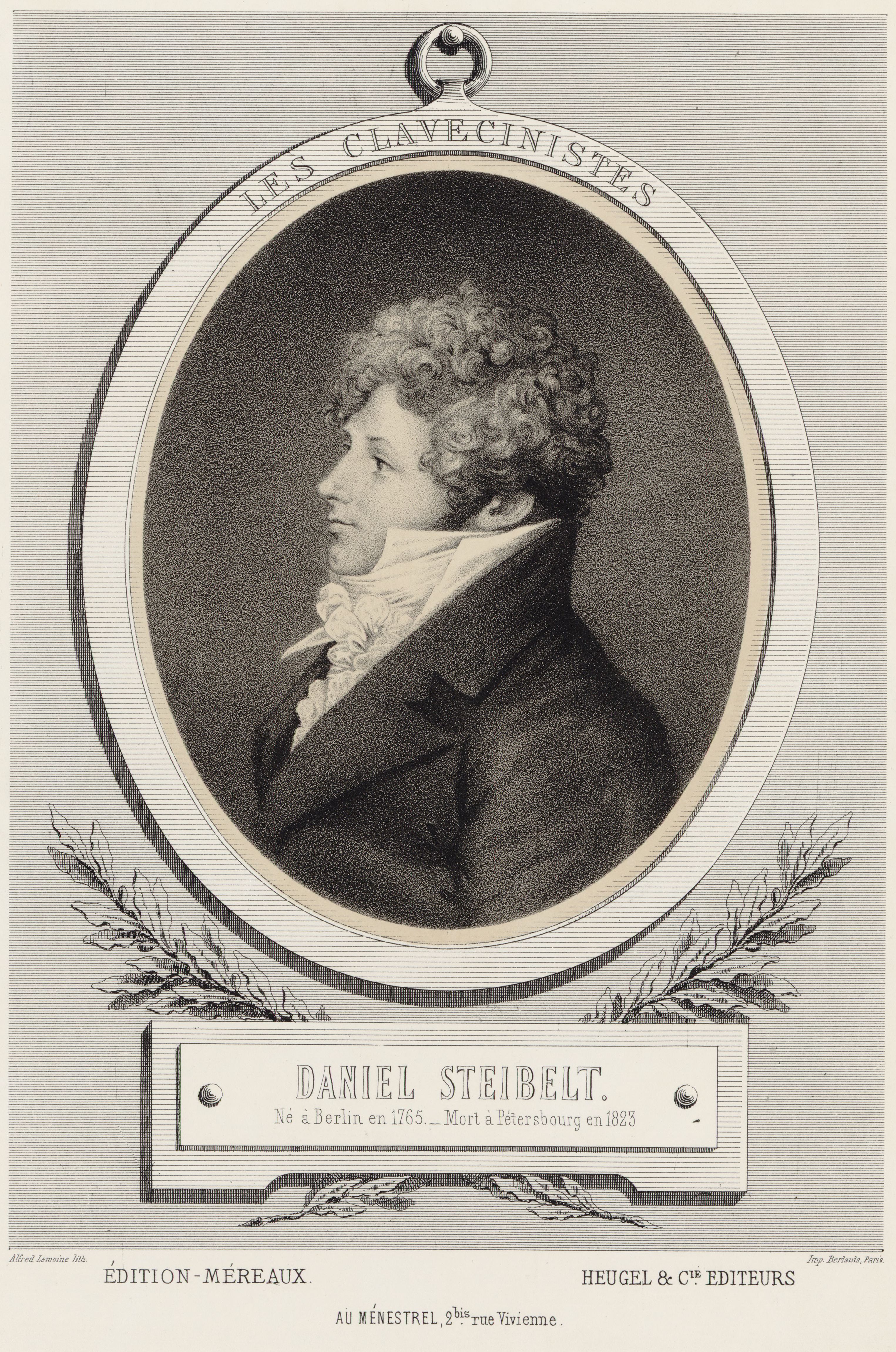Daniel Gottlieb Steibelt
(October 22, 1765 – October 2 [O.S. September 20] 1823)
German pianist and composer who died in Saint Petersburg, Russia.
Harp Concerto (1807)
Picture: Jean-Baptiste Gautier Dagoty - Marie Antoinette playing her harp in morning dress (1774)
Mov.I: No tempo indication 00:00
Mov.II: Adagio 16:42
Mov.III: Rondo: Allegretto 19:48
Harp: Masumi Nagasawa, pedal harp
Orchestra: Kölner Akademie
Conductor: Michael Alexander Willens
Daniel Steibelt was born in Berlin, and studied music with Johann Kirnberger before being forced
by his father to join the Prussian army. Deserting, he began a nomadic career as a pianist before settling in 1790 in Paris, where he attained great popularity as a virtuoso by means of a piano sonata called La Coquette, which he composed for Marie Antoinette.[1] Also in Paris, his dramatic opera entitled Romeo et Juliette, which was later highly regarded by Hector Berlioz,[2] was produced at the Théâtre Feydeau in 1793. This is held by many to be his most original and artistically successful composition.
Steibelt began to share his time between Paris and London, where his piano-playing attracted great attention.[1] In 1797 he played in a concert of J. P. Salamon. In 1798 he produced his Concerto No. 3 in E flat containing a Storm Rondo characterised by extensive tremolos, which became very popular. In the following year Steibelt started on a professional tour in Germany; and, after playing with some success in Hamburg, Dresden, Prague and Berlin, he arrived in May 1800 at Vienna, where
he challenged Beethoven to a trial of skill at the house of Count von Fries. Accounts of the contest
record it was a disaster for Steibelt; Beethoven reportedly carried the day by improvising 즉흥적으로at length on a theme taken from the cello part of a new Steibelt piece, placed upside down on the music rack.[3]
Following this public humiliation
In 1808 he was invited by Tsar Alexander I to Saint Petersburg, succeeding François-Adrien Boieldieu as director of the Royal Opera in 1811.[1] He remained there for the rest of his life. In 1812, he composed The Destruction of Moscow, a grand fantasy for piano dedicated to the Russian nation.
He generally ceased performing in 1814, but returned to the platform for his Concerto No. 8, which was premiered on March 16, 1820, in Saint Petersburg, and is notable for its choral finale. This was four years before Beethoven's unconventional Symphony No. 9, and was the only piano concerto ever written (excluding Beethoven's Choral Fantasy) with a part for a chorus until Henri Herz's 6th concerto, Op 192 (1858) and Ferruccio Busoni's Piano Concerto (1904).[7]
Besides his dramatic music, Steibelt left behind him an enormous number of compositions, mostly
for the piano. His playing was said to be brilliant, though lacking the higher qualities which characterized that of such contemporaries as Cramer and Muzio Clementi.[1] Despite this, his playing and
compositional skills enabled him to build a career across Europe. Grove describes him as "extraordinarily vain, arrogant, discourteous, recklessly extravagant and even dishonest." Such harsh moral
judgements are justified by some of the facts of Steibelt's life as they have come down to us.[8] These and similar attacks on his character must be viewed with caution if a correct image of Steibelt's personality is to be reconstructed.
At his best Steibelt is an imaginative composer with strong individuality. His operas Cendrillon (1810) and Romeo et Juliette (1793), all his piano concerti, his chamber music, a selection of his numerous sonatas (e.g. Op. 45 in E flat - 1800 - and Op. 64 in G - 1809) and some piano pieces (caprices and preludes, studies Op. 78) are of a sufficient musical worth to be performed and enjoyed today.
'♣ 음악 감상실 ♣ > - 클래식(전곡)' 카테고리의 다른 글
| Peter, Paul and Mary - Blowing in the Wind (0) | 2015.11.21 |
|---|---|
| Wagenseil - Harp Concerto in G major (0) | 2015.10.11 |
| Jean-Baptiste Krumpholz - Harp Concerto in F major, Op. 9 (0) | 2015.10.10 |
| Karol Lipiński - Symphony in B-flat major, Op.2 (1809) (0) | 2015.10.10 |
| Franciszek Lessel - Piano Concerto in C-major, Op.14 (1810) (0) | 2015.10.09 |
